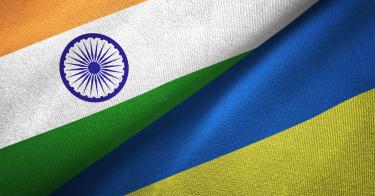India’s position on the Ukraine war has been the subject of extensive Western news coverage, and criticism, since the Russian invasion in February 2022.
Detractors often point to India’s increased purchases of Russian fuel, numerous abstentions at United Nations votes to condemn Russia, and New Delhi’s refusal to directly criticize Vladimir Putin as evidence of Indian favoritism toward Moscow. India, according to some prominent commentators, has “taken Russia’s side”REF and has “not sufficiently affirmed itself as a great power.”REF
The reality is quite different. While it is true that the Indian government has not been as vocal as its Western counterparts in condemning Russia’s invasion or severing economic ties, a careful reading of Indian diplomacy suggests that New Delhi does not support Russia’s war and has repeatedly signaled its disapproval, albeit in subtle ways. What is more, U.S. attempts to drive a wedge between the two countries are unlikely to succeed and risk undermining convergence in an even more consequential struggle underway in the Indo–Pacific.
The Indian Way
Informed in part by the legacy of non-alignment, India’s reluctance to criticize Putin’s war is, for better or worse, consistent with its long diplomatic history of avoiding explicit criticism of great powers engaging in foreign conflicts. That applies even to wars with which the Indian government disagrees, such as the U.S. invasion of Iraq.
Even if New Delhi was not inclined toward diplomatic ambiguity, it would be reluctant to break sharply with Moscow for practical reasons. The Indian military remains heavily reliant on Russia after decades of sourcing arms imports from Moscow since the two countries’ 1971 defense treaty. Wedged between two nuclear-armed rivals, China and Pakistan, with which it has two active territorial disputes, the Indian government believes that it cannot afford to compromise its own defense capabilities—which depend on Russia for servicing, spare parts, and ammunition—by creating a public rupture with Moscow.
Furthermore, while India has abstained from several U.N. votes criticizing Putin, the Indian government has repeatedly signaled its discomfort with Russia’s actions. Last March, when Russia sought India’s support for a favorable Security Council resolution on Ukraine, New Delhi declined. Last August, when Ukrainian civilians were slaughtered by Russian forces in Bucha, the Indian government condemned the atrocity and called for an international investigation. Last October, the Indian government explained that it was “deeply disturbed by the recent turn of developments in Ukraine,” called for “immediate cessation of hostilities,” and insisted that “dialogue is the only answer.”REF
The Indian government’s “continuous references to respect for international law, the UN Charter, and principles of territorial integrity and [sovereignty] suggest India does not in fact consider Russia’s invasion legitimate,” writes Indian analyst Happymon Jacob.REF “All these statements, without naming [Russia], are clearly aimed at indicating unhappiness towards what Russia has done,” explains India’s former Permanent Representative to the United Nations.REF
Perhaps most directly, in a face-to-face meeting with President Putin in September 2022, Prime Minister Narendra Modi argued that “today’s era is not the era of war.”REF Months later, Modi’s “not the era of war” formulation was adopted by the G20 group of leading global capitals in the communique issued at its Bali summit.REF
This May, Russia and India “suspended efforts to settle bilateral trade in rupees, after months of negotiations failed to convince Moscow to keep rupees in its coffers.” Weeks later, Modi met with Ukrainian President Volodymyr Zelensky in person in Hiroshima, on the sidelines of the G7 summit. The “Ukraine war is a big issue in the world,” he told Zelensky. “I don’t consider it to be just an issue of economy, politics; for me, it is an issue of humanity. India and I will do whatever we can for resolution of war.”REF
A Grim Outlook
While India remains reluctant to criticize Putin directly, for both tactical and strategic reasons the Ukraine conflict is likely to weigh heavily on what was already a deteriorating long-term outlook for Indian–Russian ties.
Tactically, Russia’s war on Ukraine is likely to make Russia a less reliable and desirable defense supplier, which had long served as the most robust pillar in the relationship. Even with paltry people-to-people exchanges and minimal trade (in a normal year, India does as much trade with the U.S. in a month as it does with Russia in a year), defense ties always remained robust. Roughly three-quarters of India’s legacy defense platforms remain Russian-origin and to date Russia has been the only country willing to lease or sell India advanced platforms, such as aircraft carriers and nuclear submarines, or co-produce advanced missiles, such as the Brahmos cruise missile.
However, over the years, India has had intermittent complaints about Russian quality, reliability, and servicing, and has been increasing diversification of its defense imports, most notably purchasing nearly $30 billion in defense equipment from the U.S. since 2008.REF This year, India announced that it is preparing to ground its fleet of Soviet-era MiG-21s “by 2025, following the death of two officers in a crash, the latest in a series of casualties involving the single-engine jet’s failure.”REF
The war in Ukraine is likely to further strain defense ties. India recently “scrapped a long-pending deal for 48 additional Mi-17 V5 medium-lift helicopters as well as ‘deferred’ the acquisition of 21 more MiG-29 and 12 Sukhoi-30MKI fighters from Russia.” With tremendous strain on its own stockpiles and defense industrial capacity, “as a result of its invasion of Ukraine, Russia will increasingly struggle to meet the value [arms] market’s needs.”REF
At a strategic level, the Ukraine conflict is accelerating an even more consequential shift: Russia’s tightening embrace of China.REF The Indian–Russian partnership was forged in 1971 amid mutual alignment against China. Discounted Russian arms and favorable votes at the U.N. Security Council afforded India some protection against its eastern neighbor at a time when America had embargoed arms sales to India and was embracing Pakistan.
As ties between Beijing and Moscow warmed after the turn of the millennium, many Indian analysts were quick to dismiss the China–Russia entente as a fleeting tactical partnership. When Russia turned to China more decisively after its Russian invasion of Crimea in 2014, New Delhi remained hopeful that the trend was reversible. Russia’s growing proximity to China since its invasion of Ukraine, exactly three weeks after Presidents Xi Jinping and Putin declared a “no limits partnership” in Beijing,REF is deflating remaining notions of “flipping” Russia against China.
In many ways, India is now looking to the U.S., not Russia, as its primary option for balancing China’s rise. There was a time when India relied on advanced Russian arms to maintain a qualitative edge over Chinese forces. Now, not only is Russia selling the same platforms to China, but Beijing is ahead of New Delhi in the queue.
Russia was conspicuously absent when Chinese forces provoked a deadly crisis along the disputed border with India in 2020, resulting in nearly two dozen Indian casualties. By contrast, the U.S. condemned China’s actions and rushed supplies to India during the crisis.
Last November, India held a joint exercise with the U.S. Army high in the Himalayas, 60 miles from the disputed Chinese–Indian border, designed to “increase interoperability for high-altitude warfare.”REF Last December, the Chinese military attempted an incursion along the Chinese–Indian border in Arunachal Pradesh. That effort was thwarted by the Indian Army during which the U.S. shared “actionable satellite imagery” that was “more detailed and delivered more quickly than anything the U.S. had previously shared.”REF
Finally, the growing proximity between Beijing and Moscow, at a time when Chinese–Indian relations have sunk to new lows, is also fueling a sense of estrangement in New Delhi that is bleeding into multilateral forums. While India is famously promiscuous with its foreign engagements, participating in the Quad (Australia, India, Japan, and the U.S.) one week and in BRICS (Brazil, Russia, India, China, and South Africa) the next, not all multilateral engagements are created equal. Indian enthusiasm for BRICS, the Shanghai Cooperation Organization (SCO), and the Russia–India–China (RIC) trilateral was increasingly tepid before the deadly 2020 border crisis. Since then, these fora have become even more paralyzed, even as the Quad marches on.
Conclusion
Speaking privately, many Indians have mixed feelings about the conflict: Some believe the Russian narratives that the West provoked insecurity in Putin’s regime with talk of NATO’s eastward expansion and bears some responsibility for pushing Moscow into Beijing’s arms.
However, they also find Russia’s invasion of Ukraine morally indefensible and strategically calamitous.
Once a taboo topic, Russia is now openly questioned and criticized in India’s mainstream media, where commentators have questioned the wisdom of Russia’s invasion, the performance of its military, its future reliability as a defense supplier, and the human rights abuses perpetrated in Ukraine.
It is increasingly apparent that in even the best-case scenario for Moscow, Russia will emerge from this misadventure weaker economically, diplomatically, and militarily; more at odds with the West; and more dependent on China.
In short, the Ukraine conflict is putting both of Russia’s advantages to India—geopolitical balancing of China and exclusive defense supplier—at risk. Moscow is no longer the reliable hedge against China it once was and, unlike during the Cold War, India now has superior options for defense partners.
For U.S. policymakers, there is little merit to creating a rift with New Delhi over a war it opposes and whose outcome it is unlikely to affect. Better to focus on the priority theater—the Indo–Pacific—where convergence is strong and India is consequential, than on the secondary theater where convergence is weak and India’s impact is marginal. In this case, the juice would not be worth the squeeze.
Jeff M. Smith is the Director of the Asian Studies Center at The Heritage Foundation.




